While linguists argue about the longest word in the world, I learned something more useful in a Tokyo classroom: real Japanese curse words. Yes, swearing exists in this Asian language, and if you’ve ever watched anime or lived in Japan, you’ve heard these spicy Japanese words before.
In this post, we’ll break down the most common Japanese swear words and insults, their use, and what they really mean. But let’s be clear: the aim here isn’t to pepper your speech with Japanese profanity, okay? Rather, it’s to equip you with the knowledge to better understand native speakers, navigate social interactions, and appreciate Japanese culture in its full glory.
- Exit 8: Japanese Words You Need To Survive Cannes' New Horror Hit
- 18 Inspirational Japanese Quotes And Their Meanings
- How to use ChatGPT to Study Japanese (with Prompts)

Does Swearing Exist In Japanese?
Japanese people swear significantly less than Americans in everyday conversation. As a rule, the Japanese do not often use insults in everyday language, and you can walk around the street and not hear any obscenities at all. The strongest Japanese curse words pale in comparison to their English counterparts.
Instead of dropping F-bombs, Japanese culture has developed more subtle ways to express frustration:
- Speech level manipulation - Using the intricate system of keigo (honorific language) and switching between formal and casual speech to express displeasure
- Mild exclamations - Expressions like "Moh!" (Ughh!), "Hara ga tatsu" (I'm irritated), or "Atama ni kuru" (I'm losing my temper)
- Tone over content - It's usually not a single word or phrase that conveys the meaning, but the delivery and tone of speech that reveals one's intentions
Most swear words in Japanese are done by using more common words or phrases and adding a couple of words or changing the way you say them. This cultural preference for indirect communication means that many Japanese keep their feelings inside rather than spitting it all out, relying on subtlety over shock value to express anger or frustration.
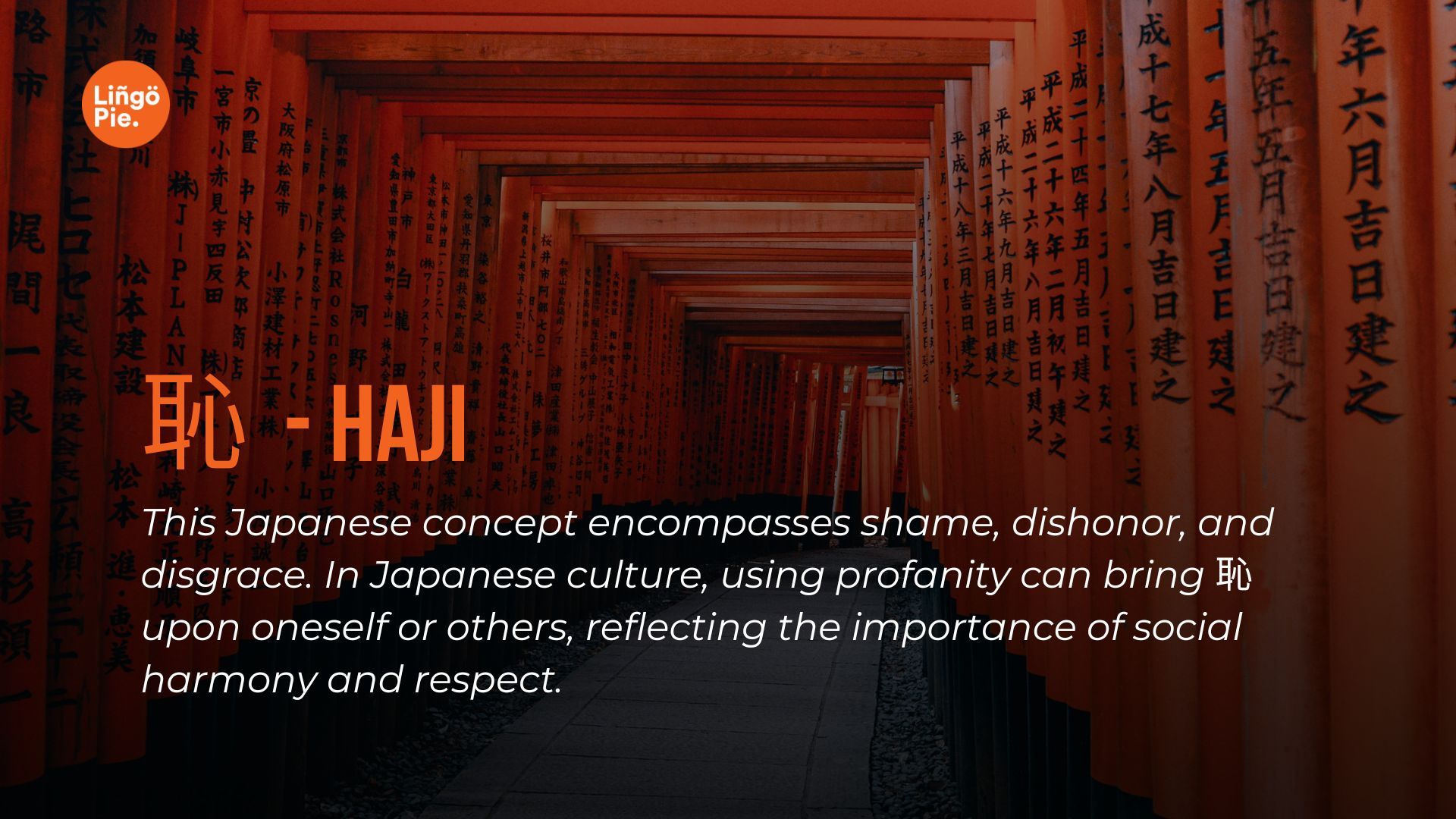
Common Japanese Swear Words
Japanese curse words work differently than English ones. Most aren't about sex or religion! Instead, they're about calling someone stupid, telling them to shut up, or expressing frustration when things go wrong. Curious? Let's get to know the most common ones you'll actually hear.
Here’s a quick list of the most common Japanese swear words we’ll cover:
- クソ (Kuso) – Shit / Damn
- ふざけるな (Fuzakeru na) – Knock it off / F*ck off
- しんじまえ (Shinjimae) – Drop dead / Go to hell
- ちくしょう (Chikushou) – Damn it / Son of a bitch
- バカ (Baka) – Stupid / Idiot
- あほ (Aho) – Moron / Dumbass
- だまれこのやろう (Damare konoyarou) – Shut up, you bastard
- ブス / ブ男 (Busu / Buotoko) – Ugly woman / man
- うざい (Uzai) – Annoying / Pain in the ass
- わるがき (Warugaki) – Spoiled brat
- どけ (Doke) – Get out of my way!
- やりまん (Yariman) – Slut
- 死ねえ (Shinee) – Go die
クソ (Kuso)
Meaning: Fuck
"Kuso" literally means "poo" or "shit" and serves as a jack-of-all-trades in Japanese profanity. As a standalone exclamation, "Kuso!" is equivalent to yelling "Damn!" or "Shit!" when frustrated. It's relatively mild, common in casual settings or media.
But "kuso" truly shines in its role as an adjective. Slap it in front of another word, and you've instantly created a Japanese insult.
Take クソガキ (kusogaki) for example. By combining "kuso" with "gaki" (brat), you've crafted the delightful phrase "shitty brat."
ふざけるな (Fuzakeru na)
Meaning: Fuck off or stop messing with me
Born from the verb ふざける (fuzakeru) meaning "to mess around," this sharp command tells someone to knock it off, pronto. Add the な (na) for an extra bite, and you've got yourself a verbal stop sign.
Does this sound familiar? Well, you likely encountered this Japanese swear word in heated arguments or tense scenes in manga and Japanese anime before. If not, you probably heard the casual shortened version form which is ふざけんな (fuzakenna).
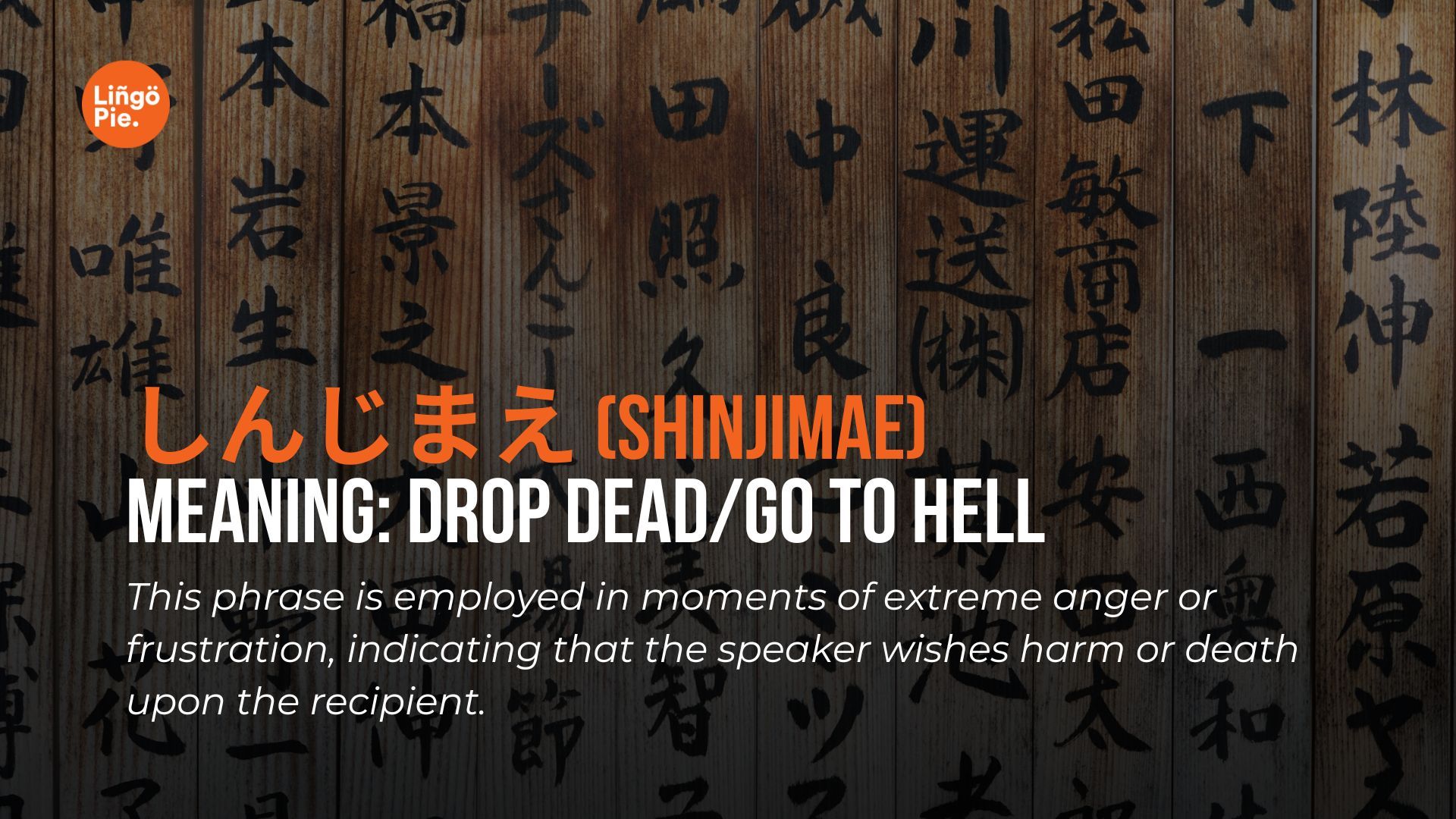
しんじまえ (Shinjimae)
Meaning: Drop dead/Go to hell
Shinjimae is one of the harshest expressions in the Japanese language, derived from the verb 死ぬ (shinu) meaning "to die." It literally translates to "die" but is used to mean "go to hell" or "drop dead." This phrase is employed in moments of extreme anger or frustration, indicating that the speaker wishes harm or death upon the recipient.
Due to its severity, it's rarely used in real-life situations and is more commonly encountered in fictional media to depict high-conflict scenarios. Shinjimae is considered one of the most offensive phrases in Japanese and is not suitable for casual use.
ちくしょう (Chikushou)
Meaning: Son of a Bitch or damn it
Depending on the context and tone, chikushou can express a range of emotions from frustration and dismay to surprise or even excitement. Commonly, chikushou is used as an exclamation rather than being directed at a specific person.
You might hear it when someone encounters an unexpected setback, like "ちくしょう、パンクだ" (Chikushou, panku da) meaning "Damn it! I have a flat tire."
Interestingly, it can also be used positively, such as when celebrating a sports team's victory. However, this word can also be used when something really great happens. For example, when your favorite sports team wins a match. Of course, context and tone are everything here.
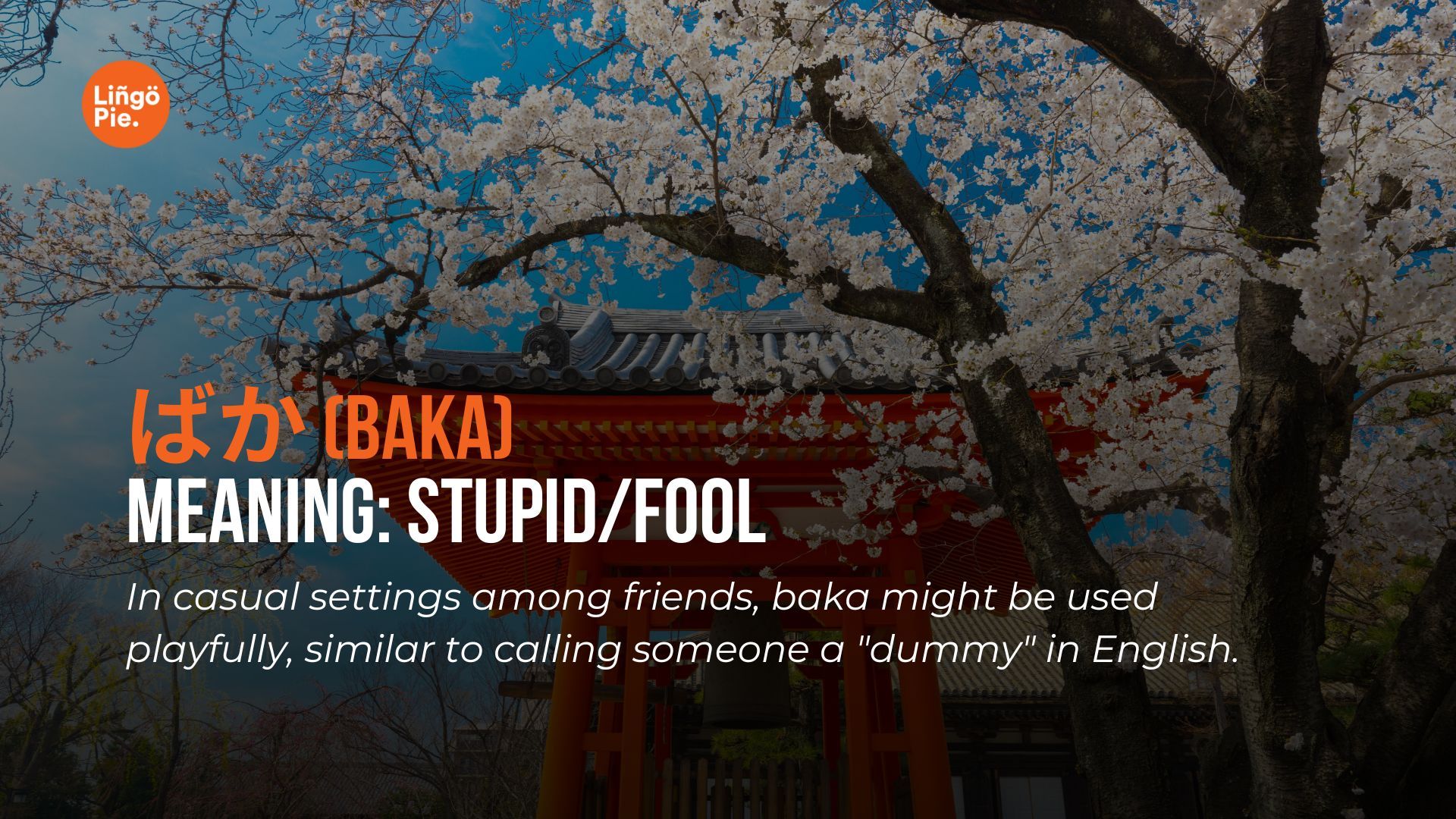
ばか (Baka)
Meaning: Stupid/Fool
In casual settings among friends, baka might be used playfully, similar to calling someone a "dummy" in English. However, when said with genuine anger or to a stranger, it becomes more offensive. For instance, Baka can be used on its own as an exclamation or directed at someone (バカやろう - baka yarou, meaning "you idiot").
あほ (Aho)
Meaning: Idiot/Moron
In the Kansai region, particularly in Osaka, aho is generally considered milder than baka and is used more casually, sometimes even affectionately among friends. Conversely, in standard Japanese and eastern regions like Tokyo, aho can be perceived as harsher than baka.
The word can be used on its own as an exclamation or directed at someone (あほか - aho ka, meaning "Are you stupid?"). Despite its regional variations, aho remains a relatively mild insult compared to stronger Japanese profanities. However, like baka, it's best avoided in formal or polite situations unless you're very familiar with the local linguistic norms and your relationship with the listener.
だまれこのやろう(Damare konoyarou)
Meaning: Shut up, you bastard
This phrase combines two elements to create a forceful and insulting command. "Damare" (だまれ) is the imperative form of "damaru" (to be silent), essentially meaning "shut up." "Kono yarou" (このやろう) is a harsh way of addressing someone, similar to "you bastard" or "you asshole" in English.
The addition of やろう (yarou) to insults significantly increases their severity. It's a masculine term typically translated as "bastard" or "asshole," and is not used when addressing women. When combined with "damare," it creates a highly confrontational phrase that not only tells someone to be quiet but also insults them in the process.
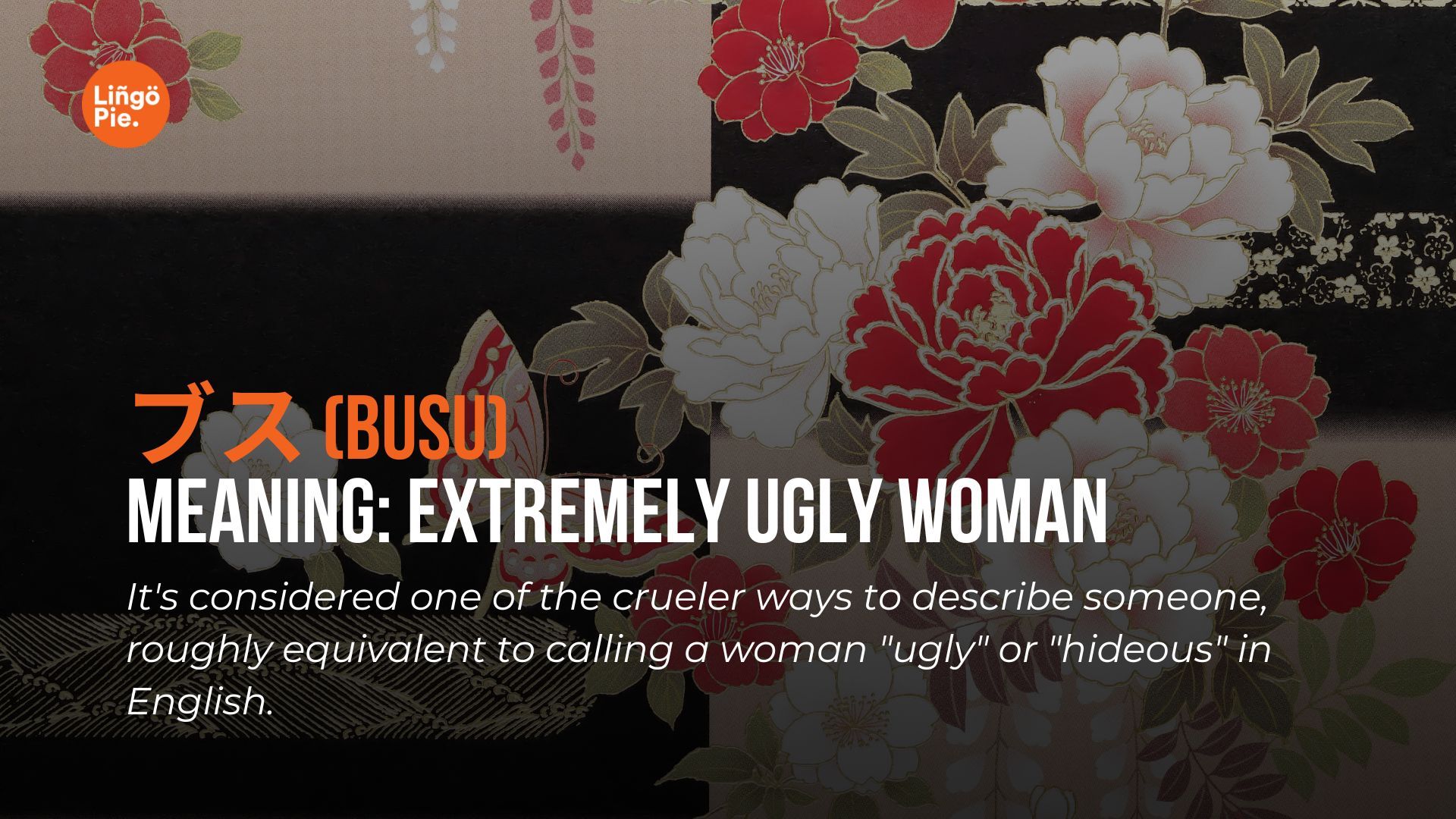
ブス (Busu)
Meaning: Extremely ugly woman
Busu is a highly offensive and demeaning term used to insult a woman's appearance. It's considered one of the crueler ways to describe someone, roughly equivalent to calling a woman "ugly" or "hideous" in English.
ブ男 (Buotoko)
Meaning: Extremely ugly man
Buotoko is the male counterpart to busu, used to insult a man's appearance. It's a highly offensive term that translates to "extremely ugly man" or "hideous guy" in English.
Like its female counterpart, buotoko is a cruel and demeaning insult that should not be used lightly. It reduces a person to their physical appearance in a harsh, derogatory manner.
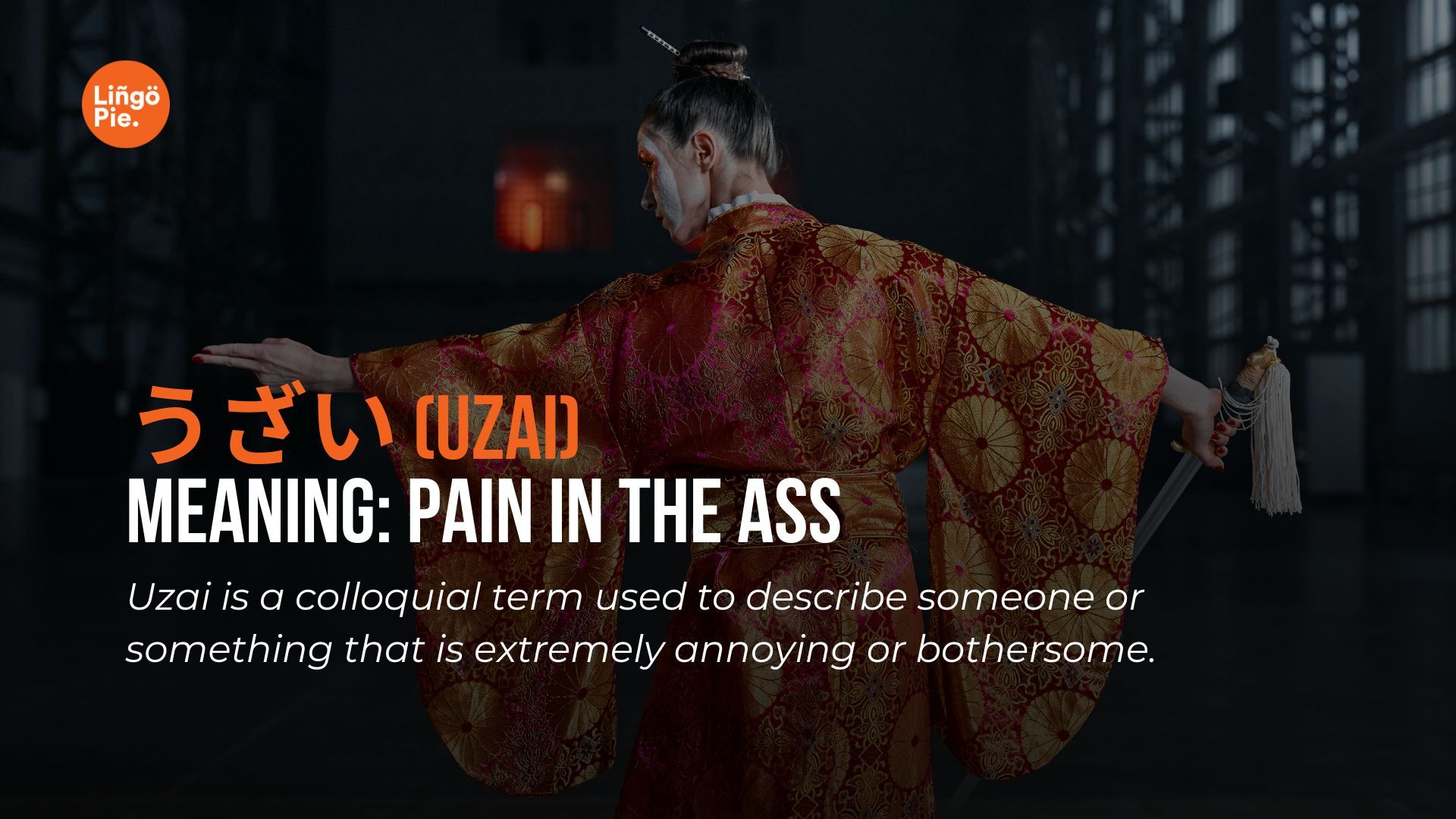
うざい (Uzai)
Meaning: Pain in the ass or extremely annoying
Uzai is a colloquial term used to describe someone or something that is extremely annoying or bothersome. It's roughly equivalent to calling someone or something a "pain in the ass" in English, though it can be used more broadly to describe any irritating situation or person.
わるがき (Warugaki)
Meaning: Spoiled brat
Warugaki is a compound word that combines わる (waru), meaning "bad" or "evil," and がき (gaki), meaning "kid" or "brat." Together, it translates to "bad kid" or more colloquially, "spoiled brat."
This term is used to describe a misbehaving, disrespectful, or poorly-mannered child. It carries a strong negative connotation, implying that the child is not just momentarily mischievous, but consistently troublesome or ill-behaved. Warugaki can be used to refer to actual children, but it's also sometimes applied to adults who act immaturely or irresponsibly.
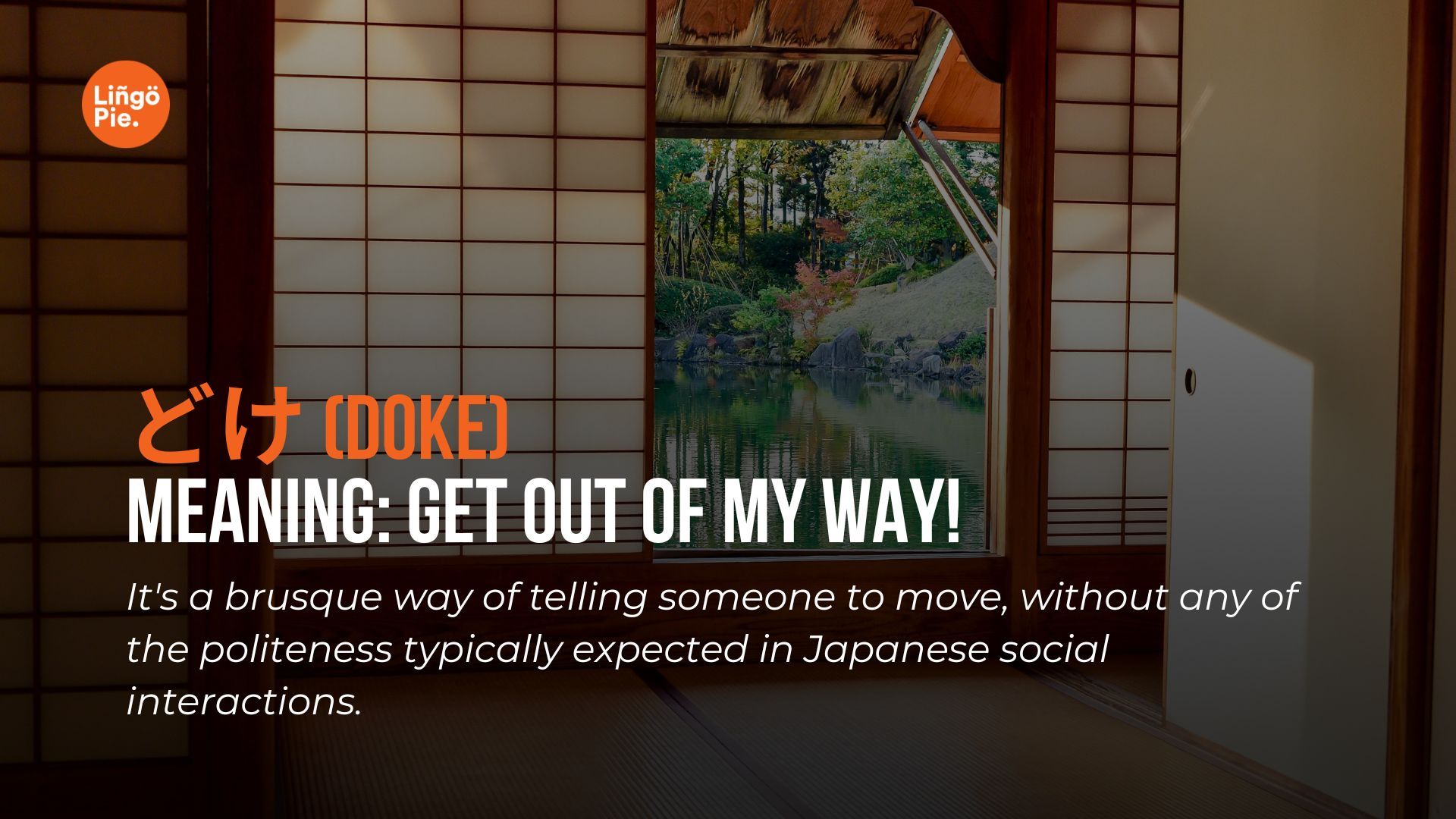
どけ (Doke)
Meaning: Get out of my way!
This term is considered quite rude and aggressive in Japanese. It's a brusque way of telling someone to move, without any of the politeness typically expected in Japanese social interactions. The abruptness of doke makes it inappropriate for most everyday situations.
やりまん (Yariman)
Meaning: Slut
Yariman is a highly offensive and vulgar term used to describe a promiscuous woman, similar to "slut" or "whore" in English. It's a compound word combining やり (yari), from the verb やる (yaru) meaning "to do" or in this context "to have sex," and まん (man), a crude slang term for female genitalia.
This word is extremely derogatory and misogynistic. It's considered one of the most offensive terms in Japanese, particularly towards women. The use of yariman is not only insulting but also reflects poorly on the speaker, as it demonstrates a lack of respect and a willingness to use harmful, sexist language.
死ねえ (Shinee)
Meaning: Go die
Shinee is an extremely harsh and offensive command that literally means "die" or "go die." It's derived from the verb 死ぬ (shinu), meaning "to die," with the elongated "ee" sound at the end adding emphasis and making it sound more aggressive.

How Swearing Works In Anime VS. Real Life
Anime characters swear more than real Japanese people. A lot more. That’s because anime is more focused on exaggerating life experiences. The insults are sharper, the tone louder, and the reactions bigger.
Common anime swearing quirks:
- バカ (Baka) is used in almost every genre—romance, comedy, shonen, you name it. Sometimes it's playful, sometimes brutal.
- このやろう (Kono yarou) shows up in fight scenes constantly. Paired with yelling and explosions. Rarely used in everyday life.
- くそったれ (Kusottare) sounds like something your anime villain would growl before throwing a punch. Literal meaning? "Shithead."
- 死ね (Shine) is one of the harshest words in Japanese, but appears surprisingly often in dark or violent series like Tokyo Ghoul or Attack on Titan.
- うるせえ!(Urusee!) is a ruder, rougher way of saying “shut up!”—delivered best by angry delinquents or tsundere types.
Why does anime use so much rude language? Because characters don’t follow social rules. They’re angry, emotional, and dramatic. And swearing sells that. It also helps you learn the boundaries about what sounds aggressive, childish, and deadly serious.
So even if you never say these words, you’ll hear them. And you’ll understand exactly what kind of moment it is.
When Can You Use Japanese Curse Words?
Short answer: you usually shouldn't. But you absolutely need to know them.
Japanese society runs on politeness and indirect speech. Walk down a street in Tokyo and you won’t hear people yelling “shinee!” or “kuso!” at each other. Swearing is rare, and the social hierarchy (senpai/kouhai, boss/staff, elder/younger) makes rudeness risky.
However, it's important to recognize that these words still exist. You’ll hear them in anime. You’ll catch them in movies, music, and heated conversations between close friends or enemies. And if someone says them to you, you’ll want to understand what they mean—fast.
So don’t go around yelling “bakayaro” at strangers. But don’t stay clueless either. Understanding these words means understanding how Japanese people vent, snap, and push back.
Why Learn Japanese Curse Words?
You might wonder why you should learn rude words in Japanese, especially if you have no interest in using them. Well, as they are a part of the language, they come up in various social environments, as well as in aspects of culture, such as anime, and other Japanese media.
So, if you want to understand Japanese TV shows, movies, and music more completely, you will need to know these words and their meanings. Swear words teach you:
- How emotion sounds in Japanese
- How tone shifts meaning instantly
- What’s rude, what’s playful, and what’s nuclear
Moreover, you can perform better in social situations if you completely understand the context and tone of the conversation. This means understanding swear words in Japanese and how to use them.
Japanese learners can learn bad language by watching Japanese entertainment shows and movies, listening to music and radio, and speaking to Japanese people!
Japanese anime is a particularly great resource for learning new swear words in Japanese, as it is a genre known for being a little risqué.
Check out Lingopie to find some great TV shows and movies in Japanese and other languages, all with interactive transcripts to optimize learning. Check out this blog post to find what is the best way to learn Japanese.
- Spanish curse words
- Portuguese curse words and insults
- Tagalog swear words
Ready to Hear These Words in Action?
Now you know what to listen for when Japanese people drop their polite masks. However, this is just the beginning. To really understand how Japanese people talk when they’re being themselves, you need to hear these expressions in context. That’s where authentic Japanese content comes in.
Lingopie makes this easy. You can watch Japanese shows and films with interactive subtitles that break down slang, casual speech, and yes, the occasional curse word your textbook skipped. Click on any word you don't recognize, save it for later, and build your vocabulary from real conversations instead of stilted dialogues about ordering coffee.
Ready to sound like you learned Japanese from real people instead of a robot? Try Lingopie today!
FAQs: Japanese Swear Words
What is the rudest Japanese swear word?
There are a lot of Japanese curses that are incredibly rude. Some of the strongest expletives include kutabare (くたばれ), meaning "f*ck you" or "drop dead", and shinee (死ねえ), meaning "die!". Clearly, when you are deeply upset with a person in Japan, telling them to die is a great way to cause offense.
What is the F word in Japanese?
In Japanese, kuso means the f-word. Literally, the word's meaning is something like "poo" or "shit", but it is best translated as "f*ck!" when used as an angry interjection. For example, if a Japanese person stubs their toe, they might shout kuso!
Which Japanese curse word should I never say?
There is a time and a place for all Japanese expletives, but there are some that are considered extremely rude and should be used with extreme care. In your culture, these words might just seem funny or mildly offensive, in Japan, there is definitely a wrong time to use them.
Any time you are with people of a higher social hierarchy, you should never say baka, kuso, or any of the other words on this list.
If I don't want to swear in Japanese, do I need to learn the swear words?
Yes, even if you do not intend to use them, it is still advisable that you learn the meaning of the most commonly used swear words in Japanese. This will help you to navigate social events and understand more fully the context of Japanese anime and other media.










